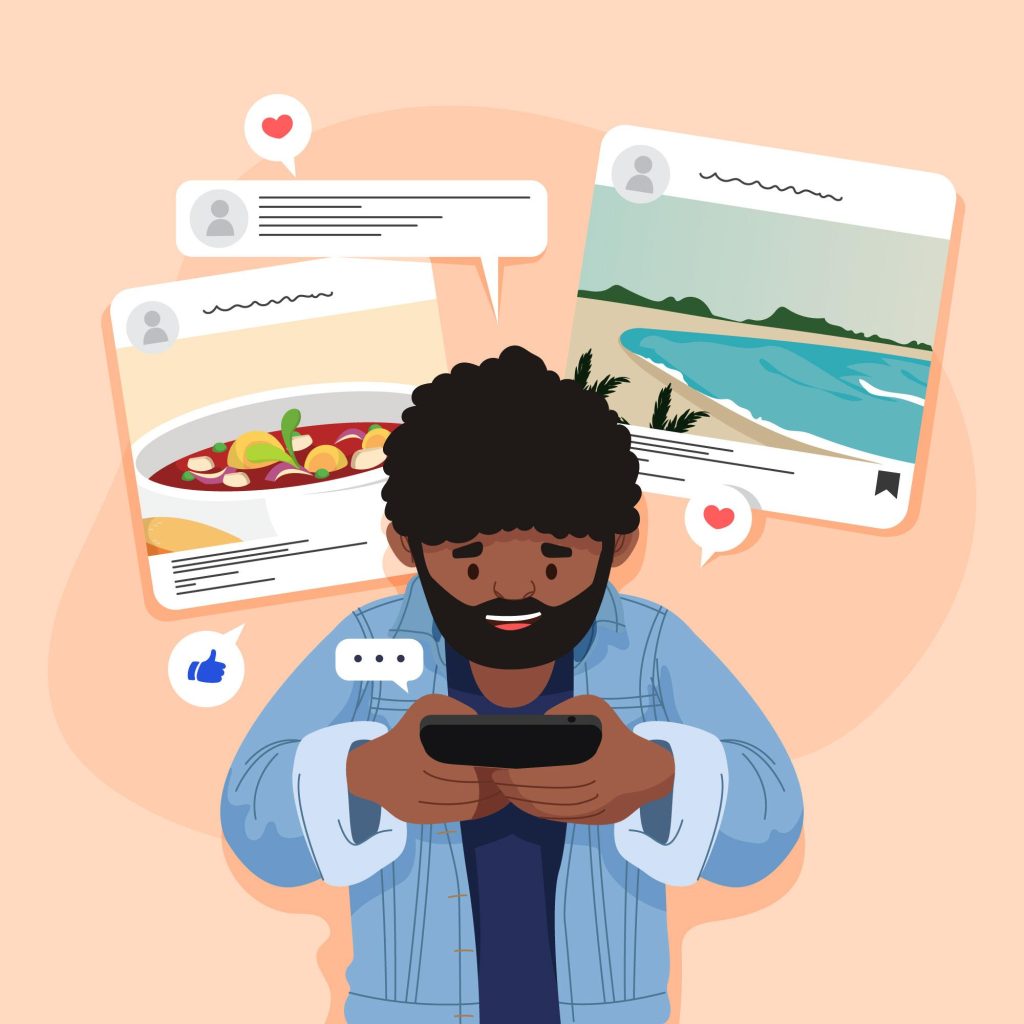
‘FOMO’ or the Fear of Missing Out was included by the Oxford Dictionary in 2013. That’s enough to convey that whatever FOMO is, is commonplace!
Think about the guy who checks his facebook, twitter and instagram accounts countless times in a day, to remain “updated”; or the girl who attends 3 parties on a Saturday night so that she doesn’t miss out on the awesome time that everyone else will have.
These examples don’t sound like faraway ones right? Today, a lot of people find themselves flitting from one event to the other, picking one novel opportunity after the other, not wanting to miss out on anything. What cost this comes at, or what this constant chase does to them doesn’t seem to matter. All that matters is: – ‘am I missing out?’
Through this article, the Inner Space Team explains what FOMO is, what causes it to occur and what can be done about it.
What really is 'FOMO'?

“When the ‘bird in hand’ is not enjoyed in the pursuit of ‘a 100 birds more’, a person is experiencing the Fear of Missing Out.” – Kunjal
FOMO is a generic fear that others might be having great experiences that one might miss out on. ‘What if I don’t do it and it is great?’ ‘Everyone else is doing this, how can I not?!’ are typical thoughts that suggest FOMO.
What Is The Problem With Having FOMO?
You are probably wondering what the problem is with FOMO. Don’t we all want more in life? What you might not realize is that slowly, an anxiety can start building up. You go through experiences not because they add value to you, but because you end up feeling anxious when you miss out on them. You feel restless, regretful and irritable at the prospect of missing out. You judge yourself for not being “updated” enough, “cool” enough, or “good “ enough. That’s where the problem lies. What’s more, you’re not able to enjoy whatever you already have. You go through life chasing experiences; without pausing to notice what you already are. Ultimately, this can lead to irritability, feelings of inferiority, unhappy relationships, a constant state of dissatisfaction, fatigue and even burnout.
What Are The Typical Signs Of FOMO?

Some of you may identify that you have FOMO. But some of you may not even know that you’re experiencing FOMO. Your loved ones or people in closer inner circles might be able to recognize it and point it out to you.
When you have FOMO, you typically go through the following:-
- Anxiety about any Rewarding Experience that you might be missing out on
- Doing anything it takes to accommodate the experience, even if it means chaotic changes in plans or blatant inconvenience to others
- Compromising on priorities to accommodate the experience – neglecting obviously important tasks, missing deadlines at work, not tending to one’s family
- Constantly remaining in touch with ‘latest updates’ – Compulsively checking news updates, checking your phone every time it buzzes, remaining constantly hooked on to facebook, whatsapp, twitter etc. even if you are at work, being constantly on the lookout for jobs, clothes, music, gadgets and events you would love.
- Feelings of regret when you think you’ve missed out – feeling that you could have better utilized your time or that you made “the wrong choice”
If you experience these signs, you probably have FOMO to some degree.
Living with FOMO is tough, not only because you remain under constant pressure, but also because it slowly erodes into your mental space and peace. Before we look at what can be done to deal with FOMO, let’s also spend some time understanding what factors, psychological and social, could trigger or aggravate it:-

Is FOMO holding you back?
Counseling can be a great tool for you to manage and overcome your anxiety caused by FOMO and lead a happy, stress-free life.
We are here for you.
Psychological Underpinnings Of FOMO

FOMO is a manifestation of certain underlying thoughts, feelings and past experiences. We’ve outlined some important ones here:-
Constant Comparison with Others
FOMO is actually a constant comparison with others – their experiences versus yours; having to hear others’ happy stories, and not having as ‘happening’ a story to tell. It might not be a competitive, aggressive comparison. But it’s very much there. You’re always comparing yourself with the world at large – other people your age especially. You want to keep up with them. If you don’t, you start to feel anxious. When one lives like this, it’s bound to result in an underlying restlessness. You start to focus more on how each experience adds to your ‘list of experiences’ rather than on the experience itself. For example – Rather than enjoying a drink for what it is, you are more likely to think of how you will post this on facebook, how to get the pictures right so that people will like it. You would also check to see what else is happening that you should not miss out on.
Upbringing and Home Environment
One way in which one could develop FOMO is being brought up in such an environment. Sometimes, parents or other close ones themselves suffer from anxiety and do lots so that they feel better. The child observes this on a daily basis and picks up the tendency.
Another way FOMO could slink into a person’s psyche is when a person finds the world outside to be incredibly different than the one he or she grew up in. Exposure to the world and to what other people’s lives are could come as a surprise and make the person feel inadequate. One then attempts to ‘bridge this gap’. But one also develops a fear of feeling inadequate, which makes them chase experiences, i.e., develop FOMO
Fear of Knowing How You Really Feel about Yourself
FOMO could also be a defense – something to take your attention away from what you really feel about your life. Sometimes, there is a deep seated anxiety about life that is unaddressed. You don’t want to find out how you really feel deep within about your life. It is genuinely scary to look within sometimes. But the anxiety remains, making you fill your life with as many things as possible.
Psychologist Andrew Przybylski researched FOMO and found that those most susceptible to this fear have unsatisfied psychological needs of being loved and feeling secure. They feel worried and anxious that they might lose what they have or they might never really make it to the top. To them, their achievements are not enough. They pit themselves against ideals, end up feeling invalidated and continue to chase experiences to feel better.
Social Media
The virtual world makes you privy to a wide range of information about people’s personal and professional lives. Yes, this does lead to a lot of exciting and interesting opportunities for work and to connect with people. However, this information can be overwhelming.
“Social media- facebook, twitter, instagram- reminds you of what you are missing out on, what you could be, what you ‘should be’.” – Malini
This leads to a cycle of checking or staying connected with others, comparing yourself to them, feeling inadequate and then trying to compensate.
How Can One Deal With FOMO?
Making Peace with Missing Out
“It is impossible to do everything, or to be everywhere. No matter what you do, there are always going to be more events than you can accommodate, more places than you can visit.” – Megha
It’s inevitable that you are going to miss out on something or the other. Being aware of this is important. You can’t possibly do everything – recognizing this is the first step towards being compassionate towards yourself, and resolving FOMO.
Being Mindful
Mindfulness, simply put, is staying in the present. FOMO does not allow you to enjoy what you are already doing. It keeps you focused on ‘what next’? or ‘how good is this?’ and not really on the experience. You are not able to really ‘be’ in situations. It’s ironical that you are chasing satisfaction in life but end up getting only discontentment. Mindfulness slowly reverses this tendency. It helps you soak in and experience fully whatever it is that you are doing right now. A mindful activity is anything that gives your brain the exposure to staying in an activity, in the moment, with gradually decreasing instances of interruptions, distractions, multitasking and restlessness. It could be anything from meditating to eating, as long as it’s done mindfully. Gradually, you will feel lesser anxiety about what you are missing out on, because you will be able to derive greater satisfaction from whatever you are already experiencing.
Taking a Quick Decision about Events
One of the worst things to do is to remain on the fence about a decision. As long as something is left undecided, it laps up your mind space. That’s why it is imperative to say “no” to an opportunity as quickly as possible, if you feel you are unable to commit to it 100%.
The Trick of Social Media
“Remember the age-old adage: “the grass is greener on the other side”? Facebook, twitter, instagram, snapchat show you only the ‘other side’.” – Anusha
Most people mainly share their moments of happiness on facebook, not their boring routine or an upsetting fight they had with their partner. So, you get to see people’s lives at their shiniest best- Their “Top 20” moments. And in comparison, your life will not seem as interesting or happy. That’s not necessarily because your life is boring. It is because you see the whole movie of your own life, not just the most interesting scenes. You see one great day, but then a lot of boring, mundane days as well. It helps to remind yourself that others are probably having as many ‘average’ days too. It’ll take care of the illusory notion of others having a fantastic time, all the time.
Notice how you feel after you go through a Social Media binge
At times, you will hear your mind saying “Let’s see what everyone is up to” and you will convince yourself that this is to “stay updated”. Check in with yourself how you’re feeling after you’ve checked in. Are you feeling satisfied? Motivated? Or are you feeling miserable? Worried that you aren’t doing enough? Or angry that other people have more time to do things? Noticing these emotions will help give you become more aware of your patterns, whether you really fear missing out and why.
Take a Day Off or go Offline
Disconnect from the virtual world and connect with the real world. Spend a day with friends or family. Or even by yourself. And maybe just focus on a few activities that you enjoy. Avoid checking your facebook/email. You will realize not much has changed since that one day that you did check it. Since, we stay in a technologically advancing, connected world, it’s tough to disconnect all the time. Maybe, you can try taking pockets of time throughout the day, where you switch off notifications for a few hours. Give yourself the space to realize what you actually do want to be updated on- however big or small. And that is what matters. Not the thousand options that exist. But what calls to you, what interests you, what YOU want to do.
Change Perspective
“One crucial step in overcoming FOMO is to see if a situation or event supports your larger goals.” – Nandita
When you experience FOMO, you don’t choose experiences anymore. You hoard them. As a result, you don’t spare enough energy for things that really matter to you. Slow down a bit. Like we’ve said above, see what really appeals to you; what you find meaningful, or what will add to your goals in life. See if the experience is worth your time, then choose 🙂
FOMO is quite prevalent. You are definitely not alone if you experience it. Just take one step at a time to resolve it and you will slowly be more rested and satisfied with your life experiences.
Have you experienced FOMO? How did you deal with it? Do share with us!
Frequently Asked Questions
Yes, absolutely. Therapy can help individuals explore underlying insecurities, develop coping strategies, and build healthier perspectives on social comparison.
Practice mindfulness and being in the present, try to limit social media use, set boundaries on your time and priorities, focus on your own goals, engage in activities you genuinely enjoy, and cultivate meaningful connections.
About the Author
This article was written by Malini Krishnan, Counselor at Inner Space. This post was consulted & approved by professional therapists practicing online therapy and counseling.
Ask a Therapist
If you are interested to know more about anxiety, self-esteem, and other mental health topics, ‘Ask A Therapist’ is a platform for you to ask your questions related to Mental Health, Mindfulness & Emotional Well-Being to our team of qualified Therapists.




